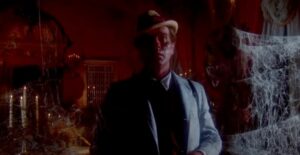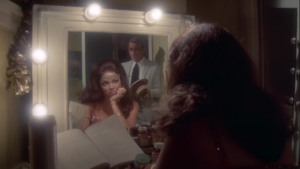Publication Date: 10-21-2024
The Night Stalker (1973) review
Dir. Dan Curtis
By: Steve Pulaski
Rating: ★★½
Following the instant success of the TV movie The Night Stalker on ABC in 1972, the network immediately greenlit a sequel, which aired almost exactly a year later in January 1973. Where screenwriter Richard Matheson found himself playing in a relatively new sandbox with the first film, experimenting with amalgamating the police procedural framework with gentle invitations into the supernatural, The Night Strangler finds his methods taking shape as formula. A hasty production timeline undoubtedly helped contribute to what stands as a compelling, if unambitious, follow-up.
The Night Strangler plops us back into the always chaotic world of newspaperman and detective Carl Kolchak (Darren McGavin). Forced to leave Las Vegas after butting heads with authorities over his reporting of a vampire serial killer, Kolchak shacks up in Seattle, where his former editor, Vincenzo (Simon Oakland), begrudgingly gives him a position as The Daily Chronicle. Kolchak’s arrival coincides with an increase of murders that mirror those that occurred in Vegas. This time, instead of the suspect biting the necks of his young female victims, he strangles them to death and drains them of their blood. Kolchak’s extensive digging into Seattle’s newspaper archives, with the help of an obedient desk-worker (Wally Cox), suggests that the perp has been committing these crimes every 21 years. It could be another vampire, which really rubs folks like Police Captain Schubert (Scott Brady) the wrong way.

The setting may have changed. The runtime might’ve been extended 15 minutes. Fundamentally, however, The Night Strangler is similar to its predecessor in nearly every facet; right down to a title you might inadvertently flub. As integral to the story as Kolchak’s detailed narration of every victim’s untimely demise is his frequent brushes with Vincenzo. Their arguments are far less civil in this one, turning into comical shouting matches anytime Kolchak begs for the privilege of doing his job. There’s a stronger level of comedy in this sequel, which replaces the cynical overtones in the first — an unwelcomed change, in my mind, despite McGavin’s proclivity for deadpan.
The extended runtime feels mostly padded by having McGavin investigate various dark spaces, and of course let the climax, set in an underground lair known as “Old Seattle,” play out in languid detail. Matheson’s writing shines best in scenes such as when a handcuffed Kolchak, along with his researcher, spell out the facts to city leaders in a desperate attempt to get them to accept that illogical is the reason for the killings. There’s also the invitation of history, with Kolchak unearthing a nugget of information about the alleged perp that connects him with a Civil War Union Army surgeon.
These inclusions keep The Night Strangler afloat enough to be a breezy 90-minute watch, even if there is the unshakeable feeling that we’ve seen this done before, if only slightly better. Both films and their respective primetime successes provided more than enough evidence to ABC to scrap their plans for a concluding chapter to a would-be trilogy in favor of creating a TV series. That series, Kolchak: The Night Stalker, would run for a brief yet impactful 20 episodes that would influence novel tie-ins of their own and later The X-Files. My appetite for police procedurals is usually minimal, so I applaud these Kolchak films not only for their human and supernatural interest, but for holding and feeding mine as well.
My review of The Night Stalker (1972)
Starring: Darren McGavin, Simon Oakland, Jo Ann Pflug, Richard Anderson, and Wally Cox. Directed by: Dan Curtis.
About Steve Pulaski
Steve Pulaski has been reviewing movies since 2009 for a barrage of different outlets. He graduated North Central College in 2018 and currently works as an on-air radio personality. He also hosts a weekly movie podcast called "Sleepless with Steve," dedicated to film and the film industry, on his YouTube channel. In addition to writing, he's a die-hard Chicago Bears fan and has two cats, appropriately named Siskel and Ebert!


